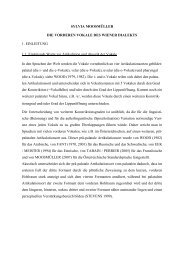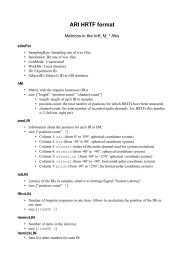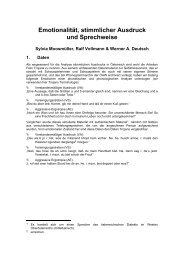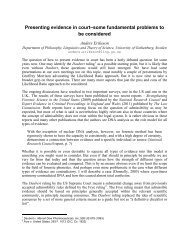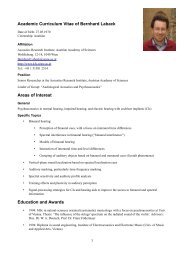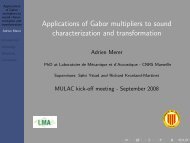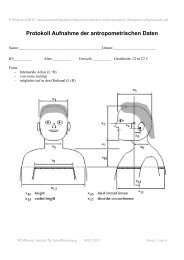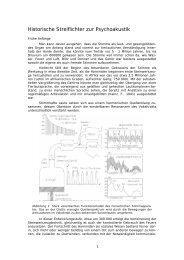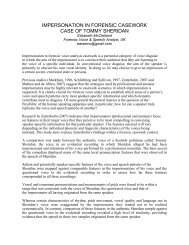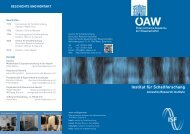- Page 1 and 2: VOWELS IN STANDARD AUSTRIAN GERMAN
- Page 3 and 4: Vowels in Standard Austrian German
- Page 5 and 6: Vowels in Standard Austrian German
- Page 7 and 8: Vowels in Standard Austrian German
- Page 9: 1. Introduction: Setting the Theore
- Page 13 and 14: 5 Vowels in Standard Austrian Germa
- Page 15 and 16: 7 Vowels in Standard Austrian Germa
- Page 17 and 18: 9 Vowels in Standard Austrian Germa
- Page 19 and 20: 11 Vowels in Standard Austrian Germ
- Page 21 and 22: 13 Vowels in Standard Austrian Germ
- Page 23 and 24: Hz 3000 2500 2000 1500 1000 500 0 N
- Page 25 and 26: 17 Vowels in Standard Austrian Germ
- Page 27 and 28: � Speaker sp127: Student, male, 2
- Page 29 and 30: 21 Vowels in Standard Austrian Germ
- Page 31 and 32: 23 Vowels in Standard Austrian Germ
- Page 33 and 34: 25 Vowels in Standard Austrian Germ
- Page 35 and 36: 27 Vowels in Standard Austrian Germ
- Page 37 and 38: 29 Vowels in Standard Austrian Germ
- Page 39 and 40: 31 Vowels in Standard Austrian Germ
- Page 41 and 42: 33 Vowels in Standard Austrian Germ
- Page 43 and 44: 35 Vowels in Standard Austrian Germ
- Page 45 and 46: 37 Vowels in Standard Austrian Germ
- Page 47 and 48: 39 Vowels in Standard Austrian Germ
- Page 49 and 50: 41 Vowels in Standard Austrian Germ
- Page 51 and 52: 43 Vowels in Standard Austrian Germ
- Page 53 and 54: 45 Vowels in Standard Austrian Germ
- Page 55 and 56: 47 Vowels in Standard Austrian Germ
- Page 57 and 58: 49 Vowels in Standard Austrian Germ
- Page 59 and 60: 4. Vowel inventory and features 51
- Page 61 and 62:
53 Vowels in Standard Austrian Germ
- Page 63 and 64:
55 Vowels in Standard Austrian Germ
- Page 65 and 66:
57 Vowels in Standard Austrian Germ
- Page 67 and 68:
59 Vowels in Standard Austrian Germ
- Page 69 and 70:
Spontaneous speech Long vowel + len
- Page 71 and 72:
63 Vowels in Standard Austrian Germ
- Page 73 and 74:
Spontaneous speech Long vowel + len
- Page 75 and 76:
67 Vowels in Standard Austrian Germ
- Page 77 and 78:
Height 0 10 20 30 40 u i o ö ü e
- Page 79 and 80:
71 Vowels in Standard Austrian Germ
- Page 81 and 82:
73 Vowels in Standard Austrian Germ
- Page 83 and 84:
Vowel category Variability Coeffici
- Page 85 and 86:
77 Vowels in Standard Austrian Germ
- Page 87 and 88:
79 Vowels in Standard Austrian Germ
- Page 89 and 90:
81 Vowels in Standard Austrian Germ
- Page 91 and 92:
83 Vowels in Standard Austrian Germ
- Page 93 and 94:
85 Vowels in Standard Austrian Germ
- Page 95 and 96:
87 Vowels in Standard Austrian Germ
- Page 97 and 98:
89 Vowels in Standard Austrian Germ
- Page 99 and 100:
91 Vowels in Standard Austrian Germ
- Page 101 and 102:
93 Vowels in Standard Austrian Germ
- Page 103 and 104:
95 Vowels in Standard Austrian Germ
- Page 105 and 106:
97 Vowels in Standard Austrian Germ
- Page 107 and 108:
99 Vowels in Standard Austrian Germ
- Page 109 and 110:
101 Vowels in Standard Austrian Ger
- Page 111 and 112:
103 Vowels in Standard Austrian Ger
- Page 113 and 114:
105 Vowels in Standard Austrian Ger
- Page 115 and 116:
107 Vowels in Standard Austrian Ger
- Page 117 and 118:
109 Vowels in Standard Austrian Ger
- Page 119 and 120:
111 Vowels in Standard Austrian Ger
- Page 121 and 122:
113 Vowels in Standard Austrian Ger
- Page 123 and 124:
115 Vowels in Standard Austrian Ger
- Page 125 and 126:
117 Vowels in Standard Austrian Ger
- Page 127 and 128:
119 Vowels in Standard Austrian Ger
- Page 129 and 130:
121 Vowels in Standard Austrian Ger
- Page 131 and 132:
123 Vowels in Standard Austrian Ger
- Page 133 and 134:
125 Vowels in Standard Austrian Ger
- Page 135 and 136:
127 Vowels in Standard Austrian Ger
- Page 137 and 138:
129 Vowels in Standard Austrian Ger
- Page 139 and 140:
131 Vowels in Standard Austrian Ger
- Page 141 and 142:
133 Vowels in Standard Austrian Ger
- Page 143 and 144:
135 Vowels in Standard Austrian Ger
- Page 145 and 146:
137 Vowels in Standard Austrian Ger
- Page 147 and 148:
139 Vowels in Standard Austrian Ger
- Page 149 and 150:
141 Vowels in Standard Austrian Ger
- Page 151 and 152:
143 Vowels in Standard Austrian Ger
- Page 153 and 154:
145 Vowels in Standard Austrian Ger
- Page 155 and 156:
5.3. Processes vs. Coarticulation 1
- Page 157 and 158:
149 Vowels in Standard Austrian Ger
- Page 159 and 160:
151 Vowels in Standard Austrian Ger
- Page 161 and 162:
� F3 shows a high variability in
- Page 163 and 164:
155 Vowels in Standard Austrian Ger
- Page 165 and 166:
157 Vowels in Standard Austrian Ger
- Page 167 and 168:
159 Vowels in Standard Austrian Ger
- Page 169 and 170:
161 Vowels in Standard Austrian Ger
- Page 171 and 172:
163 Vowels in Standard Austrian Ger
- Page 173 and 174:
165 Vowels in Standard Austrian Ger
- Page 175 and 176:
c(xmin, xmax) 0.000 0.001 0.002 0.0
- Page 177 and 178:
169 Vowels in Standard Austrian Ger
- Page 179 and 180:
171 Vowels in Standard Austrian Ger
- Page 181 and 182:
173 Vowels in Standard Austrian Ger
- Page 183 and 184:
175 Vowels in Standard Austrian Ger
- Page 185 and 186:
177 Vowels in Standard Austrian Ger
- Page 187 and 188:
6.2. Undershoot vs. Processes 179 V
- Page 189 and 190:
181 Vowels in Standard Austrian Ger
- Page 191 and 192:
Hz 3500 3000 2500 2000 1500 1000 50
- Page 193 and 194:
185 Vowels in Standard Austrian Ger
- Page 195 and 196:
187 Vowels in Standard Austrian Ger
- Page 197 and 198:
189 Vowels in Standard Austrian Ger
- Page 199 and 200:
191 Vowels in Standard Austrian Ger
- Page 201 and 202:
Therefore, it can be observed that
- Page 203 and 204:
195 Vowels in Standard Austrian Ger
- Page 205 and 206:
197 Vowels in Standard Austrian Ger
- Page 207 and 208:
c(xmin, xmax) 0.00 0.02 0.04 0.06 0
- Page 209 and 210:
201 Vowels in Standard Austrian Ger
- Page 211 and 212:
203 Vowels in Standard Austrian Ger
- Page 213 and 214:
205 Vowels in Standard Austrian Ger
- Page 215 and 216:
Variability coefficient 40,000 35,0
- Page 217 and 218:
209 Vowels in Standard Austrian Ger
- Page 219 and 220:
211 Vowels in Standard Austrian Ger
- Page 221 and 222:
213 Vowels in Standard Austrian Ger
- Page 223 and 224:
6.6.3.4. The vowel /E/ 215 Vowels i
- Page 225 and 226:
6.6.3.6. The vowel /u/ 217 Vowels i
- Page 227 and 228:
219 Vowels in Standard Austrian Ger
- Page 229 and 230:
221 Vowels in Standard Austrian Ger
- Page 231 and 232:
223 Vowels in Standard Austrian Ger
- Page 233 and 234:
225 Vowels in Standard Austrian Ger
- Page 235 and 236:
227 Vowels in Standard Austrian Ger
- Page 237 and 238:
229 Vowels in Standard Austrian Ger
- Page 239 and 240:
z-score 5,00 4,00 3,00 2,00 1,00 0,
- Page 241 and 242:
233 Vowels in Standard Austrian Ger
- Page 243 and 244:
235 Vowels in Standard Austrian Ger
- Page 245 and 246:
237 Vowels in Standard Austrian Ger
- Page 247 and 248:
239 Vowels in Standard Austrian Ger
- Page 249 and 250:
241 Vowels in Standard Austrian Ger
- Page 251 and 252:
243 Vowels in Standard Austrian Ger
- Page 253 and 254:
245 Vowels in Standard Austrian Ger
- Page 255 and 256:
247 Vowels in Standard Austrian Ger
- Page 257 and 258:
249 Vowels in Standard Austrian Ger
- Page 259 and 260:
251 Vowels in Standard Austrian Ger
- Page 261 and 262:
253 Vowels in Standard Austrian Ger
- Page 263 and 264:
255 Vowels in Standard Austrian Ger
- Page 265 and 266:
257 Vowels in Standard Austrian Ger
- Page 267 and 268:
259 Vowels in Standard Austrian Ger
- Page 269 and 270:
261 Vowels in Standard Austrian Ger
- Page 271 and 272:
263 Vowels in Standard Austrian Ger
- Page 273 and 274:
265 Vowels in Standard Austrian Ger
- Page 275 and 276:
267 Vowels in Standard Austrian Ger
- Page 277 and 278:
Appendix 269 Vowels in Standard Aus
- Page 279:
271 Vowels in Standard Austrian Ger



